The Fortieth Regular Meeting of the Conference of Heads of Government of the Caribbean Community (CARICOM) was held in Gros Islet, Saint Lucia 3-5, July 2019 under the chairmanship of Saint Lucia’s Prime Minister Allen Chastanet.
Other Members of the Conference in attendance were Prime Minister of Antigua and Barbuda, Gaston Browne; Prime Minister of The Bahamas, Dr. Hubert Minnis; Prime Minister of Barbados, Mia Mottley; Prime Minister of Grenada, Dr. Keith Mitchell; President of Haiti, Jovenel Moise; Prime Minister of Jamaica, Andrew Holness; Prime Minister of St Kitts and Nevis, Dr Timothy Harris; Prime Minister of St Vincent and the Grenadines, Dr. Ralph Gonsalves; and Prime Minister of Trinidad and Tobago, Dr. Keith Rowley.
Belize was represented by the Minister of Foreign Affairs, Wilfred Elrington; Dominica was represented by the Minister of Foreign and CARICOM Affairs, Francine Baron; Guyana was represented by Minister of Foreign Affairs, Dr Karen Cummings; Montserrat was represented by the Minister of Trade, Claude Hogan; and Suriname was represented by the Vice President, Michael Adhin.
Associate Members in attendance were Bermuda represented by Premier, David Burt; the British Virgin Islands represented by Premier, Andrew Fahie; Cayman Islands represented by Premier Alden McLaughlin and the Turks and Caicos Islands, represented by Premier, Sharlene Cartwright-Robinson.
Special Guests in attendance were the Prime Minister of Norway, Erna Solberg, and the Secretary-General of the United Nations, António Guterres.
Secretary-General of the Caribbean Community, Ambassador Irwin LaRocque, immediate past Chair of the Community, Prime Minister of St Kitts and Nevis, Dr Timothy Harris, and Chairman of the Community, Prime Minister of Saint Lucia, Allen Chastanet, who addressed the Opening Ceremony. Secretary-General of the United Nations, António Guterres also made remarks.
The Chairman, the immediate past Chair and the Secretary-General stressed the need to complete the measures outlined in the Implementation Plan for the CARICOM Single Market and Economy (CSME). They also emphasised the impact of climate change and the importance of Security co-operation. All speakers referred to the challenges facing small states. The UN Secretary-General in recognising the severity of those challenges, committed his organisation to taking the steps it could, to improve access for small states to development financing as a priority. He further declared that eligibility for Official Development Assistance should include vulnerability criteria.
Several agreements were signed at the meeting, as well as a MOU between the Caribbean Community and the Government of Jamaica on Support for Operationalising and Institutionalising the CARICOM RMB System Phase II.
Back to the topic of the CSME, Heads of Government expressed concern at the slow pace and low level of implementation of the CARICOM Single Market and Economy (CSME) and at the lack of urgency exhibited by some Member States in enacting the necessary legislation and putting in place the administrative measures for implementation.
The Leaders recognised that there were various capacity constraints and there was need to strengthen capacity at the national level to address the challenges, in particular that of the drafting of legislation; and agreed to provide greater support to the CSME Focal Points through the strengthening or establishment of CSME Units within the Ministries with a focus on implementation in accordance with the agreed timelines.
Heads of Government urged Member States participating in the CSME as a matter of priority to undertake the necessary action at the national level as agreed in the Implementation Plan, acknowledging the importance of timely reporting on implementation action and challenges as well as of Public Education and outreach.
Other topics included the restructuring of the CARICOM Commission on the Economy (CCE). In that regard the country representatives welcomed the presentation of an Interim Report from the Chairman of the Committee, Professor AvinashPersaud, and accepted that the critical task ahead was to drive CARICOM States to stronger, more sustainable, resilient, inclusive and equitable development.
Heads of Government noted the Commission’s view that any development model should be based on the Region’s human capital. They also noted the Commission’s plan to develop and refine implementable initiatives with respect to innovation, public sector reform, transportation and the improvement of access to the financial and economic systems.
The Government Heads also engaged with representatives of the private sector, labour and civil society. They welcomed the progress made by the private sector towards the establishment of a regional private sector body – “CARICOM Private Sector Organisation (CPSO)” – to be designated an Associate Institution of the Community. They also agreed to designate the Caribbean Congress of Labour (CCL) as an Associate Institution of the Community and further welcomed its commitment to engage with the CPSO on the mechanism for its participation in that grouping.
The issue of Blacklisting was another topic thrown into the mix, and leaders expressed their deep concern at the continued blacklisting of some of the Member States and Associate Members and viewed such action as a clear and direct threat to the economic well-being of those countries and the Region. They stressed that Member States had a sovereign right to determine their fiscal policy.
Heads of Government stated that it was unacceptable that compliance with the regulatory measures and standards for tax transparency set by the recognised global authority was being disregarded by others who imposed arbitrary rules with respect to tax governance and anti-money laundering, without meaningful consultation with the affected States.
There was an expressed sentiment of abhorrence for the continued inclusion of CARICOM Member States and Associate Members on the United States list of Major Money Laundering Jurisdictions which conveys the erroneous perception of the Caribbean as high risk and so targeted for the de-risking strategies of global banks.
The Government representatives expressed the view that such behaviour undermined global rule-making and the relevant multilateral systems.
They emphasised the need for Member States to continue their vigilance in regard to the various processes underway in the European Union (EU) in order to protect their national interests.
The Heads also refined the CARICOM Strategy on Blacklisting and vowed to make greater efforts to secure a more collaborative relationship with the European Union and United States on tax governance and related matters.
Other areas of focus were security, integrating the Caribbean Science, Technology and Innovation System for socio-economic development, borders issues (Belize and Guatemala, and Guyana-Venezuela), the proposal to establish a permanent Africa-brazil-Caribbean Diaspora Commission (ABCD Commission), other upcoming summits and meetings involving heads of Government, and the need for an update on the state of affairs in Haiti, as well as the possibility of sending a delegation there.
Heads of Government welcomed the Prime Minister of Norway, Erna Solberg to this year’s proceedings. They expressed their appreciation for Norway’s leadership in addressing and supporting, issues of concern to the Community, such as concessional financing to build resilience, climate change, the environment and the sustainable ocean economy, as well as the issues of marine litter and pollution and the situation in Venezuela. In this latter regard, they expressed their support for the facilitation process being carried out by Norway.
Also during last week’s meeting, Heads of Government received an update on the situation in Venezuela and CARICOM’s mediation-related activities, carried out by their High-Level Representatives.
They reiterated the importance of resolving the crisis peacefully through dialogue between the parties.
The Leaders agreed that mediation-related activities would be continued to be pursued by the Prime Ministers (St Kitts and Nevis, Barbados and Trinidad and Tobago) designated by Conference at its 30th Inter-sessional Meeting in February 2019.
The Heads expressed support for the facilitation process being carried out by Norway with both sides of the dispute.
The 40th Regular Meeting of the Conference of Heads of Government of the Caribbean Community concluded on Friday, July 5th, 2019.


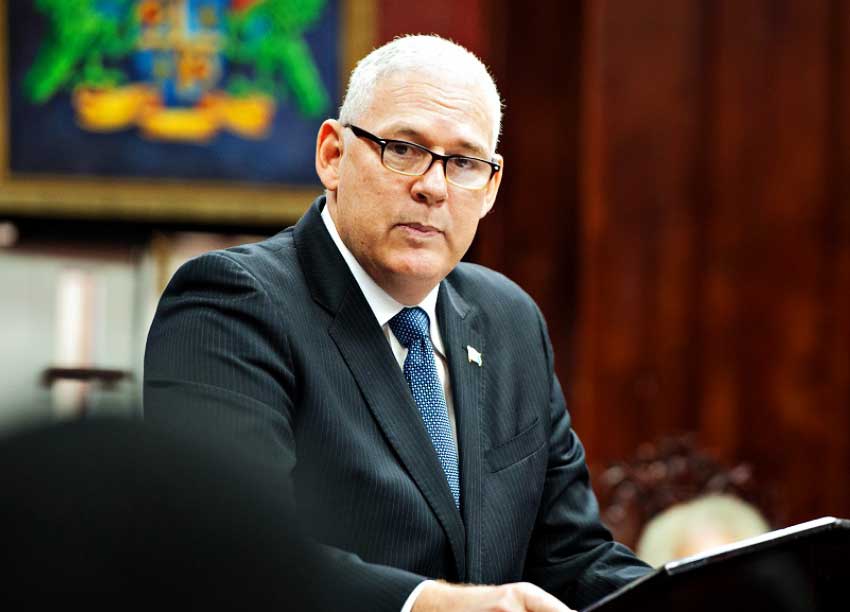

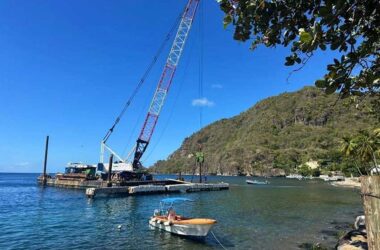
![John Paul Estephane, Minister in the Ministry of Tourism and Commerce [Photo Credit: GOSL]](https://thevoiceslu.com/wp-content/uploads/2026/01/John-Paul-Estephane-380x250.jpg)

![DIPT-RESDP SAP graduating class [Photo credit : GOSL]](https://thevoiceslu.com/wp-content/uploads/2026/01/DIPT-RESDP-SAP-graduating-class-1-380x250.jpg)

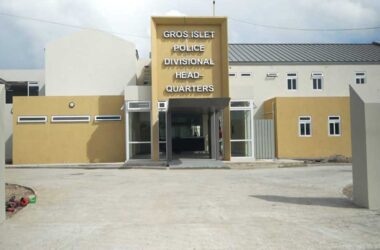


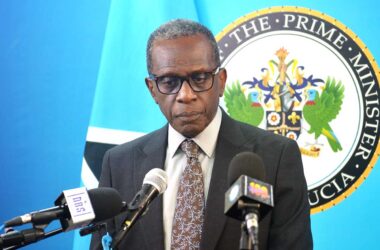

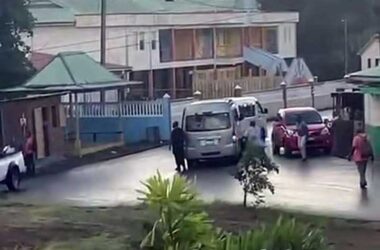
And what was the conclusion?
What can we do to prevent the Storm of NA